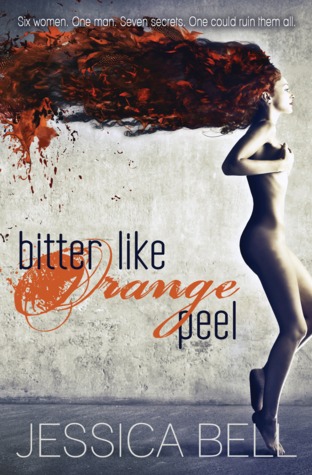Published: November 1st, 2013
Description:
Six women. One man. Seven secrets. One could ruin them all.
Kit is a twenty-five-year-old archaeology undergrad, who doesn’t like to get her hands dirty. Life seems purposeless. But if she could track down her father, Roger, maybe her perspective would change.
The only problem—Roger is as rotten as the decomposing oranges in her back yard according to the women in her life: Ailish, her mother—an English literature professor who communicates in quotes and clichés, and who still hasn’t learned how to express emotion on her face; Ivy, her half-sister—a depressed archaeologist, with a slight case of nymphomania who fled to America after a divorce to become a waitress; and Eleanor, Ivy’s mother—a pediatric surgeon who embellishes her feelings with medical jargon, and named her daughter after "Intravenous."
Against all three women’s wishes, Kit decides to find Roger.
Enter a sister Kit never knew about.
But everyone else did.
GUEST POST
USING THE COLOUR ORANGE TO ACCENTUATE THEME IN BITTER LIKE ORANGE PEEL
by Jessica Bell
 I like to use the symbolism of colour to strengthen common theme(s) I want to explore in my writing. I am fascinated by symbolic references in the books I read, too, and believe they bring a richness and depth to what we read, even if it is not immediately evident to us. So let me tell you a little bit about how I utilize the combination of colour and theme in my work.
I like to use the symbolism of colour to strengthen common theme(s) I want to explore in my writing. I am fascinated by symbolic references in the books I read, too, and believe they bring a richness and depth to what we read, even if it is not immediately evident to us. So let me tell you a little bit about how I utilize the combination of colour and theme in my work.
In BITTER LIKE ORANGE PEEL, I use the colour and flavour of ORANGE to symbolize the bitterness, distrust and sexual desire my protagonists feel.
 As stated on this website, “Dark orange can mean deceit and distrust. Red-orange corresponds to desire, sexual passion, pleasure, domination, aggression, and thirst for action.” But it also “combines the energy of red and the happiness of yellow ... represents enthusiasm, fascination, happiness, creativity, determination, attraction, success, encouragement, and stimulation,” which are all also quite prominent elements of this novel. Intriguing juxtaposition, don’t you think?
As stated on this website, “Dark orange can mean deceit and distrust. Red-orange corresponds to desire, sexual passion, pleasure, domination, aggression, and thirst for action.” But it also “combines the energy of red and the happiness of yellow ... represents enthusiasm, fascination, happiness, creativity, determination, attraction, success, encouragement, and stimulation,” which are all also quite prominent elements of this novel. Intriguing juxtaposition, don’t you think?
Orange crops up in various forms, such as rotting oranges falling from a tree (dark orange colour), orange-flavoured lip gloss (attraction), photos tinged orange over time (fascination), and an orange scrub cap (success). There are many more, but I have to say that my favourite part of the book, which reveals the main reason for the colour and title is this:
Kit leans against the kitchen sink, squinting at the sunlight creeping through the orange tree by the window. Overripe oranges are decaying on the concrete, and the acidic scent of trodden rind is wheedling its way through the cracks in the wooden frame. She thinks about her father rotting, staining with his bitter memory every footpath she is bound to tread, contaminating her mother’s tongue with his tart taste at the mere mention of his name. But Kit wants to taste the fruit—a need that has been stalking her ever since Ivy moved away. She wants to find the real “him.” She wants to know who he is below the rind.
GREEN for THE BOOK:
Green symbolizes self-respect, well-being, learning and harmony. It suggests safety and endurance, lack of experience, growth and hope.
BLUE for STRING BRIDGE:
Blue is associated with freedom, strength and new beginnings, optimism and better opportunities, loyalty and faith, power and protection. In String Bridge, blue things are always deteriorating, symbolizing the fact that the main character feels helpless, and that it’s going to be struggle to “start again”.
And in my work-in-progress, WHITE LADY, (which is a slang term for the drug, speed) I’m using the colour white to represent tainted purity, and cold, sterile environments.
As you can see, there is quite a lot you can with colour in writing. If you check out this link, perhaps the meanings of different colours might inspire you add another dimension to your work, too.
Do you like to use symbolism in your writing? Give me an example. Do you notice symbolism used in the books you read?
Goodreads ** Amazon ** Barnes&Noble
About the author:
If Jessica Bell could choose only one creative mentor, she’d give the role to Euterpe, the Greek muse of music and lyrics. This is not only because she currently resides in Athens, Greece, but because of her life as a thirty-something Australian-native contemporary fiction author, poet and singer/songwriter/guitarist, whose literary inspiration often stems from songs she’s written. Jessica is the Co-Publishing Editor of Vine Leaves Literary Journal and annually runs the Homeric Writers’ Retreat & Workshop on the Greek island of Ithaca. For more information, please visit her:
Author's Giveaway




7 comments:
Nice cover...:) Thanks for this giveaway!
I like the cover
Oooh I am intrigued!! The cover is neat, too.
Intriguing cover makes you want to read more
I am so looking forward to reading this!!I am hoping to win this because I want this bad!! Thanks for the giveaway!
Amazing giveaway!
Thanks for the chance :D
Thank you so much for being a part of the tour! :-)
Post a Comment